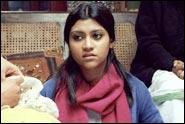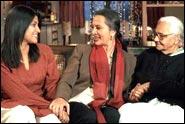 | « Back to article | Print this article |
 I
I
The movie, written and directed by Los Angeles-based Bose and executive produced by Bose's husband, NASA scientist Bedabrata Pain, and Gurdip Malik, offers two take-aways: Konkona Sensharma and reality.
| |||||||||||
The main chunk of the second take-away is the story. "The censor board gave us an adult certificate because they said, 'young people do not need to know,'" says Bose. She made the film "because there was no film on the 1984 riots, and a large part of the world still doesn't know." To that, the script is honest. If you visit Widows Colony in New Delhi, lives recounted on charpoys outside the shanties echo Amu's story.
Kajori comes to her mother's perfectly NRB (Non Resident Bengali) Chittaranjan Park house in New Delhi in search of her roots. She is an adopted child. She is not interested in smoke filled parties or PDA; she would rather do 'the poverty thing,' as her cousin's friend Kabir puts it.
She wants to eat at dhabas, give slum children chocolate and film a dhabawala's son dance to a Bollywood song. It is through the same dhabawala she learns of the riots. And her life changes as she stumbles upon her past.
 Besides Konkona's stellar sensitivity, there are some very impressive performances and cameos in the film. Top of the list is activist and Communist Party of India-Marxist Central Committee member Brinda Karat, who does a commendable job as Keya, Kajori's foster mother who shielded Kajori from her traumatic past.
Besides Konkona's stellar sensitivity, there are some very impressive performances and cameos in the film. Top of the list is activist and Communist Party of India-Marxist Central Committee member Brinda Karat, who does a commendable job as Keya, Kajori's foster mother who shielded Kajori from her traumatic past.
Pundits could find a lot wrong with the film. Kabir, Kajori's initially reluctant guide in Delhi who has his own epiphany while helping Kajori reconstruct her past, is pedestrian. The movie could have been tighter. It could, perhaps, come across as activist and pedantic. "I worked in the relief camps after the riots," says Bose.
But the characters are undeniably real: From the glitterati to the causeratti, from the very well portrayed friendly grandmother to the equally classy dhabawala's wife.
"It's a word of mouth film, so please spread the word," says Pain. He need not worry; if Fahrenheit 9/11 can hog mainstream movie hall space, so can Amu.